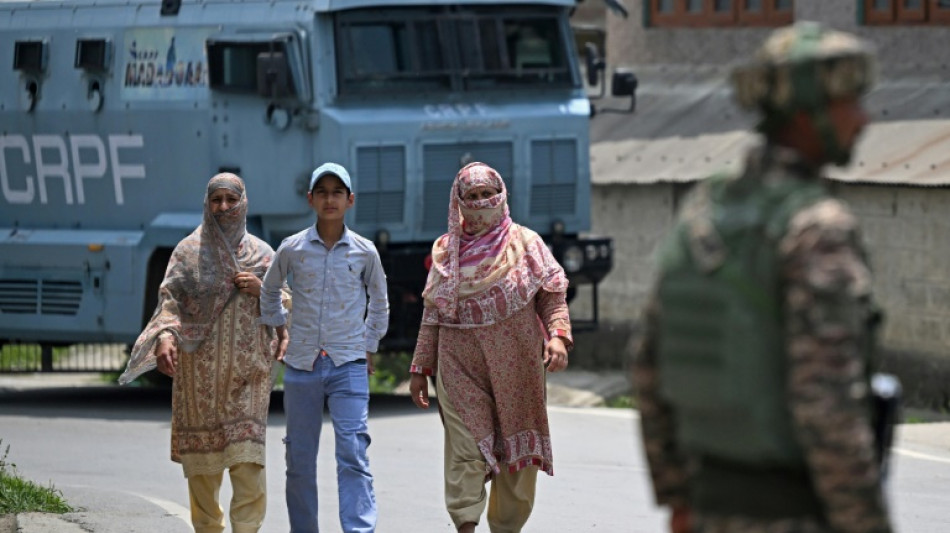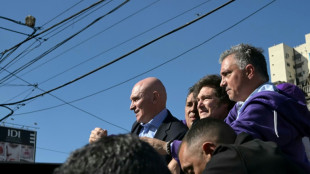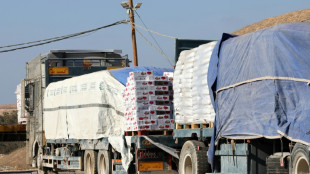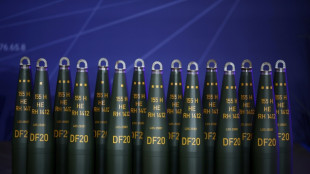

Pakistan shoots down 25 Indian drones near military installations
Pakistan's army said Thursday it shot down 25 Indian drones, a day after the worst violence between the nuclear-armed rivals in two decades.
Pakistani Prime Minister Shehbaz Sharif vowed to retaliate after India launched deadly missile strikes on Wednesday morning, escalating days of gunfire along their border.
At least 45 deaths were reported from both sides following Wednesday's violence, including children.
Pakistan's military said in a statement Thursday that it had "so far shot down 25 Israeli-made Harop drones" at multiple location across the country.
"Last night, India showed another act of aggression by sending drones to multiple locations," Pakistan's military spokesman Ahmed Sharif Chaudhry said from the army's headquarters in Rawalpindi, where a drone was downed.
"One managed to engage in a military target near Lahore," he said, adding that four troops in the city were injured.
He earlier said the operation was ongoing.
One civilian was killed and another injured in Sindh as a result of the drone incidents.
Crowds gathered at crash sites, some close to army installations, to gaze at the debris.
Blasts could be heard across Lahore.
The Civil Aviation Authority said Karachi airport was closed until 6 pm (1300 GMT), while Islamabad and Lahore were briefly shut "for operational reasons".
Pakistan and Indian have fought several wars over the Muslim-majority disputed region of Kashmir -- divided between the two but claimed in full by both.
"We will avenge each drop of the blood of these martyrs," Sharif said, in an address to the nation.
- 'Right to respond' -
Speaking after the Wednesday missile strike, India's Defence Minister Rajnath Singh said New Delhi had a "right to respond" following an attack on tourists in Pahalgam in Kashmir last month, when gunmen killed 26 people, mainly Hindu men.
New Delhi blamed the Pakistan-based Lashkar-e-Taiba -- a UN-designated terrorist organisation for the Pahalgam shooting, and the nations traded days of threats and diplomatic measures.
Pakistan has denied any involvement and called for an independent investigation into the April 22 attack.
India said on Wednesday it had destroyed nine "terrorist camps" in Pakistan in "focused, measured and non-escalatory" strikes.
Islamabad said Wednesday that 31 civilians were killed by Indian strikes and firing along the border.
New Delhi said 13 civilians and a soldier had been killed by Pakistani fire.
Pakistan's military also said five Indian jets had been downed across the border, but New Delhi has not responded to the claims.
An Indian senior security source, who asked not to be named, said three of its fighter jets had crashed on home territory.
- 'Screamed' -
The largest Indian strike was on an Islamic seminary near the Punjabi city of Bahawalpur, killing 13 people according to the Pakistan military.
Muhammad Riaz said he and his family had been made homeless after Indian strikes hit Muzaffarabad, the main city of Pakistan-administered Kashmir.
"There is no place to live," he said. "There is no space at the house of our relatives. We are very upset, we have nowhere to go."
On the Indian side of the frontier on Wednesday, Madasar Choudhary, 29, described how his sister saw two children killed in Poonch, where Pakistan military carried out shelling.
"She saw two children running out of her neighbour's house and screamed for them to get back inside," Choudhary said, narrating her account because she was too shocked to speak.
"But shrapnel hit the children -- and they eventually died."
- 'No pushover' -
India on Thursday braced for Pakistan's threatened retaliation.
In an editorial on Thursday, the Indian Express wrote "there is no reason to believe that the Pakistan Army has been chastened by the Indian airstrikes", adding that Indian military experts were "aware that Pakistan's armed forces are no pushover".
"Border districts on high alert," The Hindu newspaper headline read, adding that "India must be prepared for escalatory action" by Pakistan.
Diplomats and world leaders have pressured both countries to step back from the brink.
"I want to see them stop," US President Donald Trump said Wednesday.
Iranian Foreign Minister Abbas Araghchi is slated to meet his Indian counterpart Subrahmanyam Jaishankar on Thursday in New Delhi, days after visiting Pakistan, as Tehran seeks to mediate.
Analysts said they were fully expecting Pakistani military action to "save face" in a response to India.
"India's limited objectives are met," said Happymon Jacob, director of the New Delhi-based think tank Council for Strategic and Defence Research.
"Pakistan has a limited objective of ensuring that it carries out a retaliatory strike to save face domestically and internationally. So, that is likely to happen."
Based on past conflicts, he believed it would "likely end in a few iterations of exchange of long-range gunfire or missiles into each other's territory".
burs-pjm/ecl/lb
P.Caruso--GdR



